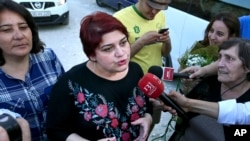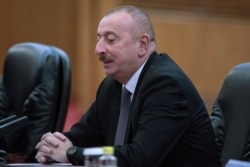As Azerbaijan readies for snap parliamentary elections on Feb. 9, journalists are warning that a nearly decade-old crackdown on press freedom is only becoming more acute.
“There is not a single television station or radio channel representing independent or alternative thought in the country,” says Khadija Ismayilova, a Baku-based investigative journalist.
Like other independent reporters in the Southern Caucasus nation, Ismayilova, who served two years in prison for investigative reports about corruption among state officials, is increasingly concerned about the ruling elite's control of most local media outlets.
Without non-partisan publications to report on upcoming elections, she said, individuals instead seek information and engage civil discourse on social media, where they risk severe consequences for expressing views that aren't aligned with the government narrative.
“It is media’s duty to create conditions for the voters so that they can make informed choices, study the candidates, their platforms, and have the ability to compare those candidate,” Ismayilova says. “It has been a while since we witnessed an election debate in Azerbaijan.”
In 2009, President Ilham Aliyev’s government banned Western broadcasters such as RFE/RL, BBC and Voice of America from local frequencies, significantly diminishing the reach of these outlets to the Azerbaijani audience.
At the time, U.S. State Department called the move a “a serious setback to freedom of speech,” a concern reiterated by subsequent White House administrations.
Since then, Aliyev has cemented his hold on power by scrapping a two-term presidential term limit and by extending the presidential term from five years to seven.
These steps have been accompanied by a crackdown on opposition activists and journalists like Ismayilova, who remains under a travel ban for publishing reports in international outlets about alleged embezzlement, secret mining interests, and illegal business ownership by the president's family.
'Independent and critical media' missing
Journalists Seymur Hazi, who served five years in prison on “hooliganism” charges, largely echoes Ismayilova’s assessment of the dismal state of Azerbaijani media.
“There are no critical newspaper publications, no television opportunities,” Hazi says. “With the exception of a few YouTube projects, as a whole, there is no longer an independent and critical media in Azerbaijan.”
After a recent visit to Baku, a delegation of election observers from the Parliamentary Assembly of the Council of Europe (PACE) noted "a lot of room for improvement," pointing out systematic harassment and criminal prosecution of individuals for expressing views critical of the government.
A November 2019 country visit report by the Council’s Commissioner for Human Rights said “no progress has been made with regard to protecting freedom of expression in Azerbaijan.”“
Prohibitions must be lifted,” independent journalist Sevinj Vagifgizi tells VOA. “If the government is confident in the righteousness of its actions, it should not be fearful. Everything has to be open, and if they are truly just and transparent, then the media should have an oversight.”
Azerbaijan 'not free'
Azerbaijani officials routinely maintain that all political freedoms, including those of the press, are respected. They furthermore reject charges by international human rights groups that individuals are persecuted for political beliefs or actions, and adamantly deny the existence of political prisoners.
Washington-based Freedom House categorized Azerbaijan "not free" in its 2019 Freedom in the World report, giving the country a score of 0 out of 4 on in terms of free and independent media.
“Constitutional guarantees for press freedom are routinely and systematically violated," Freedom House concluded in its report. "... the government works to maintain a tight grip on the information landscape.”
Paris-based Reporters Without Borders ranked Azerbaijan 166 out of 180 countries in its 2019 annual World Press Freedom Index.
This story originated in VOA's Azeri Service. Azeri service chief Asgar Asgarov contributed reporting from Washington.





